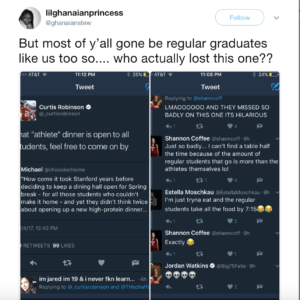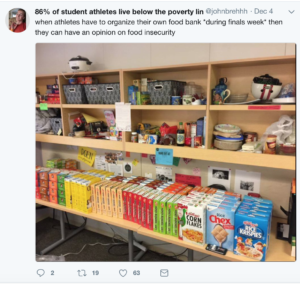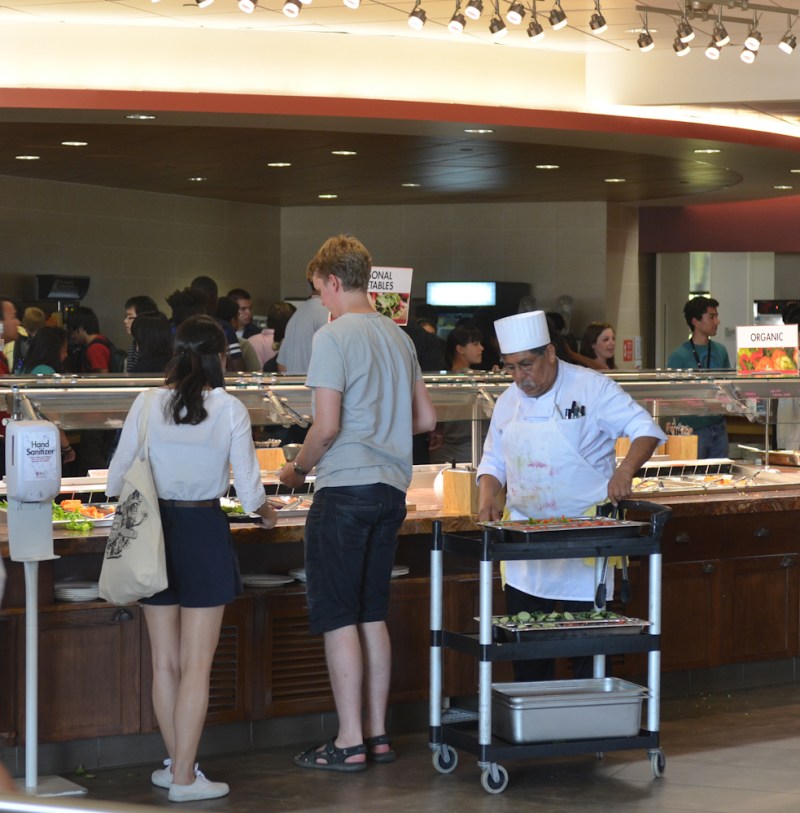A Twitter post questioning Stanford’s commitment to food security for low-income students sparked an online debate between student-athletes and those who believe the University’s recent pilot of a “High Performance and Education” dinner targeted at athletes reflects Stanford’s differing priorities.
Michael Spencer ’20, who is also a Daily staffer, wrote the original Tweet comparing the HPE pilot program launched by Residential and Dining Enterprises (R&DE) this fall with the closure of dining halls over spring break until the upcoming break in 2018.
“How come it took Stanford years before deciding to keep a dining hall open for Spring break – for all those students who couldn’t make it home,” wrote Spencer, “and yet they didn’t think twice about opening up a new high-protein dinner WHICH FOLLOWS NORMAL DINNER 5 days a week for athletes.”
Spencer’s post led to a chain of replies from athletes and low-income students that revealed longstanding concerns about access to food for both groups on the regular campus dining plan. One professor even offered to pay for low-income students’ groceries during school breaks.
Running from 7:15 p.m. – 9:30 p.m. in Branner Dining and Ricker Dining after the close of regular dinner hours, HPE is open to all undergraduate students although its hours of operation and tailored nutritional options cater specially to student-athletes. R&DE spokesperson Jocelyn Breeland emphasized that HPE was developed with all students in mind.
“The impetus was a need to meet the unique dietary requirements of students – including athletes – who require more daily calories and specific nutrients to achieve peak physical performance,” wrote Breeland in an email to The Daily. “We also know that, for many athletes, the later dinner hour better accommodates their practice schedules.”
“However, a pillar of this program from the beginning has been our steadfast determination to make this program available to all students on a meal plan,” Breeland added.
Meanwhile, all dining halls have historically been closed over spring break, a situation that can be challenging for low-income students who stay on campus. Dining halls will be open during spring break for the first time this year, after undergraduate senators brought the issue to R&DE in late 2016, said Breeland. In the 2015-2016 and 2016-2017 school years, senators had cobbled together funding from the Diversity and First-Generation Office, the Financial Aid Office, student donations and ASSU reserves to provide low-income students with meal stipends over spring break as a stopgap solution.
Responding to these food security concerns, one faculty member joined the Twitter conversation to offer to pay for low-income students’ food personally.
“Any of my [first-generation low-income] and connected students who are going to be here over the break want to link to grab some stuff, I got you,” wrote Adam Banks, professor in the Graduate School of Education and director of the Program in Writing and Rhetoric. “We can hit the grocery stores and get cards and do whatever we got to do to make sure you’re good. Hit my email fam.”
But Spencer’s comment drew ire from student-athletes, who said that the HPE program comes as a much-needed fix for athletes who regularly miss regular dining hall hours for late practices.
“Throughout the US about 86% of student athletes live below the poverty line,” wrote Shannon Coffee ’19 on Twitter. “So if there isn’t ONE dining hall open late enough to eat after a late practice where are they supposed to eat EVERYDAY?? Nobody is opposing low income students… just like you shouldn’t oppose athletes.”
Coffee was referring to a National College Players Association study on the adequacy of student-athlete poverty in “big-time” college sports, which found that 85 percent of full athletic scholarships offered by Football Bowl Series schools leave their players below the federal poverty line.
Coffee and fellow student-athlete Estella Moschkau ’21 also pointed out that the HPE program is open to all “regular students” – sometimes at the expense of athletes who arrive at the dining hall after practice, they said. Their Tweets on the subject were subsequently deleted, but other Twitter users captured and published screenshots of the original posts.

The initial comments led to conflict between some students speaking out in support of student-athletes and some speaking out for low-income students. Twitter user @johnbrehhh took issue with what they saw as the attempt to trivialize low-income students’ concerns about food insecurity, publishing a photo of a “food bank” stocked during finals week.

However, football player Nick Wilson ’19 said that athletes also face challenges getting access to meals that fit their intensive schedules and special dietary needs.
“I have never had to organize a food bank, but I have had to go to meetings, practice, lifts, for 4+ hours everyday -oh, *during finals week* too,” wrote Wilson, “while having to stay on top of grades, and finding something to eat to maintain physical performance.”
“Not saying I’m oppressed, just looking for a little respect, which I’m sure you can understand,” Wilson added. “Student-athletes work hard and the fact that our peers are coming after us hatefully is ridiculous honestly.”
The conversation got heated when former football player Austin Hooper, who finished his Stanford career in 2016, argued that student-athletes should receive preferential treatment.
“Students/Social Justice Warriors relax, where do u think they get that money to build nicer dorms for STUDENTS?” Hooper wrote in a since-deleted Tweet, which was captured in screenshots by another user. “In a capitalistic society those who contribute will get pref treatment. Crazy how ppl who don’t contribute want to be treated the same.”
In response, Twitter user @_sopadecaracol wrote, “[Wow] imagine thinking fli students should starve because they “don’t contribute” to a school like an athlete does…”
Students on both sides thought the University can do more for student-athletes and low-income students.
Men’s basketball player Josh Hanson ’18 said he thought it was “super messed up” that dining halls have not been open during spring break in the past, and that other athletes would agree with him – even as athletes face their own difficulties with campus dining.
“[Access to food for athletes and for low-income students are] separate issues, albeit both being circumstances where the university failed (for the longest time) to meet the needs of different groups of students,” Spencer wrote, reflecting on his original post in a response to Hanson. “The tweet was meant to highlight that more than anything.”
Contact Fangzhou Liu at fzliu96 ‘at’ stanford.edu.
Editor’s note: This article has been updated to reflect the participation of Austin Hooper, a Stanford football alum and current NFL player for the Atlanta Falcons, as well as to more fully represent first-generation and low-income students’ response to the conflict.
